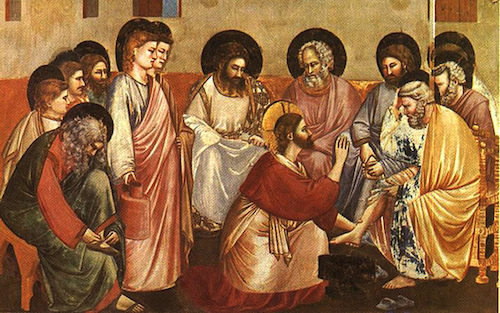We run our website the way we wished the whole internet worked: we provide high quality original content with no ads. We are funded solely by your direct support. Please consider supporting this project.

Living Incarnationally
The Christian faith is centered on the belief that in Jesus Christ God became a human being. This is commonly referred to as the doctrine of the incarnation. It means that in Jesus, God became embodied. God left the blessed domain of heaven, was born in Bethlehem, and took on our humanity that we might share in the blessedness of heaven. He took on our sin so that we might share in his righteousness. He entered the domain of Satan’s oppressive reign to free us and transform the world into a domain of his loving reign. Jesus is God’s loving embodiment in the world.
As the embodiment of God, Jesus perfectly manifested what God is like. This is why the New Testament authors refer to Jesus as the Word of God (John 1:1), the image of God (Col 1:15), and the perfect expression of God’s very essence (Heb 1:3). It’s why Jesus could say, “Anyone who has seen me has seen the Father” (John 14:9). Because Jesus is the embodiment of God, all of our thinking about God must be centered upon him.
But the earliest Christians understood that the incarnation wasn’t just about what God did once upon a time in Jesus. Because Jesus reveals who God really is, the incarnation tells us something about what God is always doing. It’s also about the incarnation of God today. While there’s only one incarnate Son of God, God is always embodying himself in the world. He does this primarily by identifying with those who submit their lives to him.
This is why Jesus followers are collectively referred to as “the Body of Christ.” We are, in a very real sense, an extension of Jesus’ earthly body. We are God’s hands, feet, and mouth in the world.
This is illustrated by the two volumes written by Luke. The gospel of Luke is about the ministry of Jesus, and Acts is about the early church. Luke opens Acts by noting that in his “former book” he wrote about “all that Jesus began to do and to teach” (Acts 1:1). The second book then is about all that Jesus continues to do and to teach. The Gospel was about what God did through Jesus’ incarnate body, while Acts is about what God continues to do through Jesus’ second, corporate body.
The followers of Jesus are called to imitate God in all things (Eph 5:1-2). This includes imitating his incarnational love in the ways we fully enter into the life of others. We are called to live incarnationally. Jesus reveals that God is a God who is willing to set aside the blessedness of his own domain and become fully present to others. So too, we are called to be a people who are willing to set aside the comforts and conveniences of our own lives and become fully present to others. This is part of what it means to “be imitators of God” and “live in love as Christ loved us and gave his life for us” (Eph 5:1-2). As we live incarnationally, God himself is continuing to be embodied in the world.
—Adapted from Present Perfect, pages 118-120
Photo credit: paukrus via VisualHunt / CC BY
Category: General
Tags: Body of Christ, Incarnation, Jesus
Topics: Following Jesus
Related Reading

Participating in the Divine Nature (Love)
When God created the world, it obviously wasn’t to finally have someone to love, for God already had this, within himself. Rather God created the world to express the love he is and invite others in on this love. This purpose is most beautifully expressed in Jesus’ prayer in John 17. Jesus prays to his…

Jesus Repudiates OT Commands on Oath-Taking: A Response to Paul Copan (#9)
In his critique of Crucifixion of the Warrior God (CWG), Paul Copan argues that “Boyd pushes too hard to make Jesus’ teaching appear more revolutionary than it really is” [italics original]. Whereas I argue that Jesus repudiates aspects of the Old Testament (OT), Copan argues that Jesus merely repudiates wrong applications of the OT, not…

Imaging God Rightly: God’s Self-Portrait, Part 3
In the previous two blogs I noted that the vision of God in our minds is the single most important vision in our lives, for it completely determines whether we’ll have a relationship with God and what kind of relationship this will be. A. W. Tozer once wrote, “What comes into our minds when we…

Jesus and Democracy
Question: I’ve heard that the reason Jesus didn’t speak up on political issues was because he didn’t have the benefit of living in a democracy. Since we do, don’t we have a duty both to God and our country to be involved in politics? Answer: If the reason Jesus didn’t speak up on political issues…

What Does it Mean to be “Holy”?
Image by much0 via Flickr People today frequently associate the word “holy” with a list “do’s” and “don’ts” that “godly” people are supposed to adhere to. The concept of “holiness” in the Bible, however, is not primary about behavior. It rather refers to something that is unique and set apart from more common things. God is…
